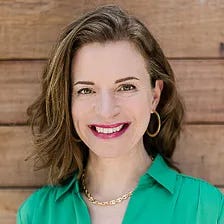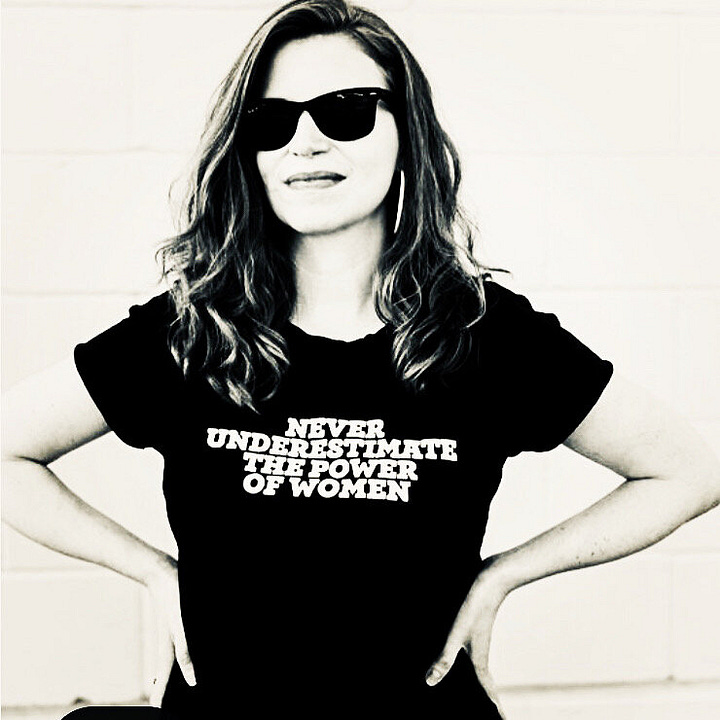It's No Mystery. It's About Thriving.
Alicia Dara, Editor of Womancake Magazine, on what midlife women need to thrive. It's about 'authentic cultural visibility' making the rest possible.
✨ A vibrant space for midlife women, The Empress now reaches over two million readers through our networks of networks. ✨ From bestselling author Alisa Kennedy Jones. ✨ If you enjoy content about midlife, humor, and agency, I’d love to welcome you as part of our community.
Fellow Empresses, How the hell are you?
Something we at The Empress have been giving a great deal of thought to lately is how thriving as a midlife woman intersects with this idea of “not giving a fuck” and how we often say at midlife “we have zero fucks to give for x”—when we still have some highly valuable and wise fucks to give for y and z.
Alicia Dara, Editor of Womancake Magazine and host of the newly launched podcast The Monday Memo recently reflected on what women need to thrive in midlife. It was so clear and spot-on that we couldn't keep it to ourselves.
The Monday Memo, if you don't know it, is a short-form podcast for paid subscribers in which Alicia explores the latest topics in the midlife women’s zeitgeist and reads from her Monday essay, which follows a quarterly theme. I highly recommend subscribing as the whole thing has the feel of The Atlantic meets Fresh Air but is geared toward GenX women.
Thriving is something Alicia studies up close in her work as a corporate presentation and media fixer to Fortune 500 executives, politicians, diplomats, and award-winning performers. Alicia sees thriving as being a state that goes beyond survival, beyond healing, into something that allows us to attain our maximum potential and fully inhabit who we are.


In her view, "Thriving" is very much a three-layer cake, and especially critical to women in the 40-plus demo. The three layers are, in her estimation, essential and well beyond considerations of “anti-aging” or HRT and are...
State-of-the-art Healthcare
Perhaps you have already had the experience of going to a healthcare provider with an issue related to your perimenopausal, menopausal, or postmenopausal journey, and were told, “It was just menopause,” or you had the impression that your healthcare provider had no idea how to help you. Of course, we now know it was not your imagination. The average OB/GYN receives less than four hours of training in menopause-related curriculum during their entire four years of medical school—a decade-plus long transition that has well over 30 complex symptoms and potential comorbidities.
As much as it is a seriously neglected issue in medical school, research, interventions, and staffing are also woefully underfunded in the U.S. healthcare system. We only began including women in research trials when In 1993, when Congress wrote the NIH inclusion policy into Federal law.
State-of-the-art healthcare is available if you are someone attempting to get pregnant, but we simply don't have anywhere near the providers, drugs, funding, programs, and research for peri, menopausal, and postmenopausal women. So, for us to thrive, we need much more clear, consistent information, a much broader data set, and a greater number of certified, insured care providers. This is the number one priority. You need to feel better, first.
What you can do:
Get with a NAMS provider for your care, if possible.
Sign the letter to support legislation and donate to drive equity in research funding for the over one billion women who will be in need by 2025:
We also need to underscore the primacy of the female body as the greatest research subject and driver of evolution of all time. To understand this, read Eve: How the Female Body Drove 200 Million Years of Human Evolution by Cat Bohannon.
Political Power
Recently, Alicia was listening to a podcast by the documentary director and activist, Michael Moore, in which he reminded her that despite the deafening volume of the patriarchy, the majority of voters in the U.S. are still women. We have a majority of the voting population. And, how wonderful would it be if every single one of us voted and participated more in state, local, and federal government scenarios—the cases of Marjorie Taylor Greene, Lauren Boebert, and (externally) Margaret Thatcher notwithstanding.
Many of us are aware enough to recognize the cautionary tales associated with extremism and those who feel disenfranchised by draconian policies. However, if more women voted and participated in closer alignment with women’s causes such as pay equity, women’s healthcare, universal childcare, paid family leave, and bodily autonomy, we might have a dramatically different political landscape.
So, to get what we need and what we want as midlife women, we need our best players at the chess board. We can’t trust the polls. After Iowa, the other night, we can’t afford to be apathetic. We also need to realize women lie about their voting choices to avoid conflict with their spouses. We need to vote up and down the ballot for democracy and greater choice for women. Black women saved America before, we all need to be there for each other—now more than ever.
What you can do (besides vote and show up to town halls):
Join and/or donate to Emily’s List!
Read:
’s brilliant, slim volume: On Tyranny: Twenty Lessons from the Twentieth CenturyCultural Visibility
While the introvert in me definitely relates to “the unexpected joys of being a nobody,” Dara, argues it is crucial that midlife women are seen, heard, and felt in the greater cultural imagination. Much like Jodie Foster, there is also an argument that you can have it both ways.
It is vital that we are actively working to counteract disastrous, harmful public narratives that are misogynistic and ageist and that appear to dictate that older women should be relegated to the margins, exiled to the crone hut, and fade into the background once we lose our fertility. Whether you want to call it The Portal or your Empress Age—this is our time to get very intentional about our cultural visibility to the world.
This is also where Jodie Foster stands out as a role model. Her lifelong pursuit of building a body of work that feels authentic to her sensibilities and which is not about celebrity or vanity, but in the end, stays focused on “the work”—THAT is what yields real enduring cultural visibility.
But you can argue, hello??? She is Jodie Foster. She has a myriad of choices when it comes to projects. And with the rest of us, when faced with the message that we are no longer relevant to the work world, it can feel like an entirely different beast. That you have fewer options and need to “narrow”.
Here is where I might counter that…
When it comes to cultural visibility and thinking more expansively about work and creativity, we often have more choices than we realize. By age 50, you are a vast human Venn diagram.
Recognizing that enables the world to do so as well.
And this is what Alicia is attempting to contribute to with Womancake. She intends to center the stories of mature women and provide a platform for them. Throughout history, the lives of girls and women are massively underreported. Part of how we will attain more prominent cultural visibility is by sharing more of our stories and being in solidarity with each other. Seeing, hearing, and learning from each other through our collective voices can dial up the volume we need to thrive with the other core pieces (health and political power).
What you can do to drive cultural visibility:
Start by committing more time to telling individual women how great they are. Support their work.
Stay in the workforce in the way that makes sense for you—whether through teaching, consulting, speaking, or pivoting to create that body of work that brings you deep satisfaction.
Be the mentor wherever you find the openings. When I was 30, I thought I knew everything. So, as a midlife woman, you are not always going to be sought out, but that doesn’t mean you won’t be needed.
Build a legacy of learning so that women who come after us don’t face the mysteries of midlife and menopause with the dismissal and message to “just suck it up” as we did.
Advance other younger women instead of actively throwing them under the bus—even when they are mistaken or running counter to a team objective.
If they are the bus throwers, model modified trust by acknowledging that you see what they are doing, and game out their actions with them.
If there is something you differ on, acknowledge the issue and ask sincere, curious questions so that dialogue and progress can happen. I like the 5Cs approach from
.The Icing: A Strong Archetypal Narrative
What holds all three layers together? I would argue it's a strong archetypal narrative. Whether it is a role model, a family member, a goddess, or an empress of your own creation, the story is core to thriving. Why? It is the heroine's journey.
Beyond all of the above, what does it mean for midlife women to "thrive" in 2024?
It is hard not to give a fuck after Monday night when it feels like America is about to hand the nukes back to a mentally unstable Cheeto with a penchant for autocracy—we should give a big, very worried fuck about this.
In her book, The Life-Changing Magic of Not Giving a Fuck, author
discusses the finite nature of resources. She likens it to a checking account with a limited amount of “fuckbucks” that you need to manage to ultimately hold more space for rest and joy in your life.There are the key issues; your family, your dreams, your priorities—the things about which you do give a fuck. It is easy to grasp her system because it is like having your own Treasury Department of Fucks wherein you are the Chief Economist in charge of Fuckonomics, allocating your fuckbucks accordingly so that your GDP ultimately flourishes.
As a generation of Tracy Flick-style strivers, GenX pleasers were NOT well-trained to do this, and so for many of us, Knight's work was a revelation.
But how to do this as a nation of midlife women so that we collectively thrive again?
The Menopause Research Equity Act needs to be passed
The 13% unemployment rate of midlife women must stop now
U.S. health insurance should be required to cover HRT and non-hormonal alternatives
Menopause must be declared a fully protected condition—like pregnancy when it comes to employment law
Roe needs to be codified into Federal law
All of the above, state-of-the-art healthcare, political power, and cultural visibility are critical to thriving as an individual midlife woman but it is also about our collective solidarity—where our fuckbucks become much more significant global fuckbudgets.
Because watching the Iowa Caucus the other night, I couldn’t help but wonder, “How do we even think about thriving and fuckbucks when we’re already so busy fucking ourselves?”
Stay safe out there.
Yours in Grandeur & Deep Sh*t,
p.s. If you are so inclined, follow us on IG for flash content & upcoming giveaways. We’re at @the.empress.age and we’d love to see you there!












Great piece and advice. I'm doing my part by supporting Funny AF Women since comedy is such a boy's club, even here on the stack.
It's great that women are finally being recognized via legislation. 🙏🏻
I only wish more natural alternatives to HRT's were available. That said, thoroughly researched too! Personally, I can't take HRT's since I had BCancer and was estrogen positive.
Thank you! I turn 50 in a few weeks and it is lovely to remember that I am part of a whole thriving crew. Great to experience your voice and take some notes from your post.